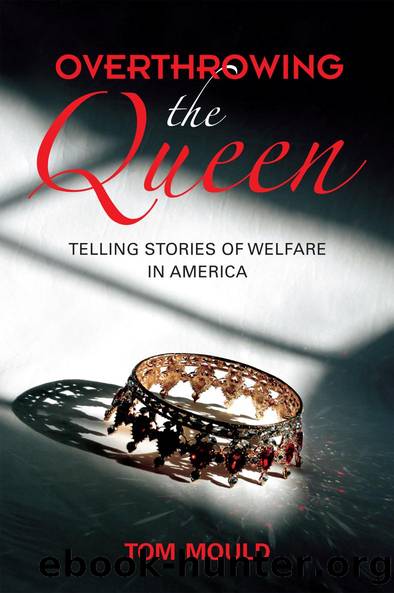Overthrowing the Queen by Tom Mould

Author:Tom Mould [Mould, Tom]
Language: eng
Format: epub
ISBN: 9780253048035
Barnesnoble:
Publisher: Indiana University Press
Published: 2020-08-25T00:00:00+00:00
NINE
WELFARE LORE IN SOCIAL MEDIA
I RECENTLY ASKED MY FRIENDSâ little girl what she wanted to be when she grows up. She said she wanted to be president of the United States. Both of her parents, liberal Democrats, were standing there. So I asked her, âIf you were president, what would be the first thing you would do?â She replied, âIâd give food and houses to all the homeless people.â Her parents beamed.
âWow, what a worthy goal,â I told her. âBut you donât have to wait until youâre president to do that. You can come over to my house and mow the lawn, pull weeds, and sweep my driveway, and Iâll pay you fifty dollars. Then Iâll take you over to the grocery store where the homeless guy hangs out, and you can give him the fifty dollars to use toward food and a new house.â
She thought that over for a few seconds; then she looked me straight in the eye and asked, âWhy doesnât the homeless guy come over and do the work, and you can just pay him the fifty dollars?â
I said, âWelcome to the Republican Party.â
Her parents still arenât speaking to me.
That is the end of the story. But whose story is it? Is it mine? Is it a true story? Is it just a joke? The first question is easy: no, itâs not mine. The second is a little trickier but probably still no. The third is harder and not agreed upon. Many readers will say, yes, itâs a joke (thus making the first two questions moot). But as this story made its rounds through social media, at least one man believed it was intended as true, even if he did not believe it was, commenting, âI donât believe this happened.â1
If genres are assumed distinct, requiring different structures, formulas, styles, and even content, how could they bleed, blend, and blur so much? How could the same story be a personal experience narrative, a legend, and a joke all without changing a single word?
In the case of âThe $50 Lesson,â the title by which the story above is known online, the problem has an easy answer. Jokes come in many forms, narrative being one of the most common. So a joke told as a story, even a personal one, is not only possible but common, particularly as a way to heighten the surprise of the punch line. Doing so reverses the expectations not only of content but of genre. The common exclamation âYou got me,â at the end of the joke, is high praise for the joke teller who managed to make you believe you were hearing a true story when you were not. The equally common âYouâre pulling my leg,â questioned during the telling of the joke, suggests the subterfuge was somewhat less successful. Blurring of first-, second-, and thirdhand stories is also common, where a true personal experience narrative may be confused with a legend and vice versa. Yet in these cases, once labeled, genres can perform different functions and lead to different interpretations, even without changing the text.
Download
This site does not store any files on its server. We only index and link to content provided by other sites. Please contact the content providers to delete copyright contents if any and email us, we'll remove relevant links or contents immediately.
Nudge - Improving Decisions about Health, Wealth, and Happiness by Thaler Sunstein(7706)
The Fire Next Time by James Baldwin(5446)
iGen by Jean M. Twenge(5416)
Adulting by Kelly Williams Brown(4574)
The Sports Rules Book by Human Kinetics(4386)
The Hacking of the American Mind by Robert H. Lustig(4383)
The Ethical Slut by Janet W. Hardy(4253)
Captivate by Vanessa Van Edwards(3839)
Mummy Knew by Lisa James(3691)
In a Sunburned Country by Bill Bryson(3542)
The Worm at the Core by Sheldon Solomon(3487)
Ants Among Elephants by Sujatha Gidla(3467)
The 48 laws of power by Robert Greene & Joost Elffers(3291)
Suicide: A Study in Sociology by Emile Durkheim(3022)
The Slow Fix: Solve Problems, Work Smarter, and Live Better In a World Addicted to Speed by Carl Honore(3009)
The Tipping Point by Malcolm Gladwell(2922)
Humans of New York by Brandon Stanton(2873)
Get What's Yours for Medicare: Maximize Your Coverage, Minimize Your Costs by Philip Moeller(2732)
Handbook of Forensic Sociology and Psychology by Stephen J. Morewitz & Mark L. Goldstein(2705)
